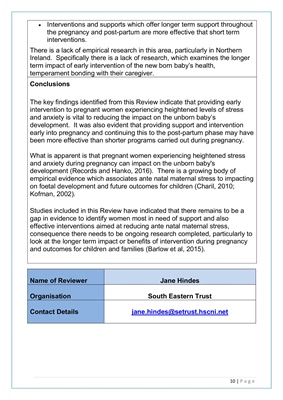
10 | P a g e
Interventions and supports which offer longer term support throughout
the pregnancy and post-partum are more effective that short term
interventions.
There is a lack of empirical research in this area, particularly in Northern
Ireland. Specifically there is a lack of research, which examines the longer
term impact of early intervention of the new born baby's health,
temperament bonding with their caregiver.
Conclusions
The key findings identified from this Review indicate that providing early
intervention to pregnant women experiencing heightened levels of stress
and anxiety is vital to reducing the impact on the unborn baby's
development. It was also evident that providing support and intervention
early into pregnancy and continuing this to the post-partum phase may have
been more effective than shorter programs carried out during pregnancy.
What is apparent is that pregnant women experiencing heightened stress
and anxiety during pregnancy can impact on the unborn baby's
development (Records and Hanko, 2016). There is a growing body of
empirical evidence which associates ante natal maternal stress to impacting
on foetal development and future outcomes for children (Charil, 2010;
Kofman, 2002).
Studies included in this Review have indicated that there remains to be a
gap in evidence to identify women most in need of support and also
effective interventions aimed at reducing ante natal maternal stress,
consequence there needs to be ongoing research completed, particularly to
look at the longer term impact or benefits of intervention during pregnancy
and outcomes for children and families (Barlow et al, 2015).
Name of Reviewer
Jane Hindes
Organisation
South Eastern Trust
Contact Details
jane.hindes@setrust.hscni.net